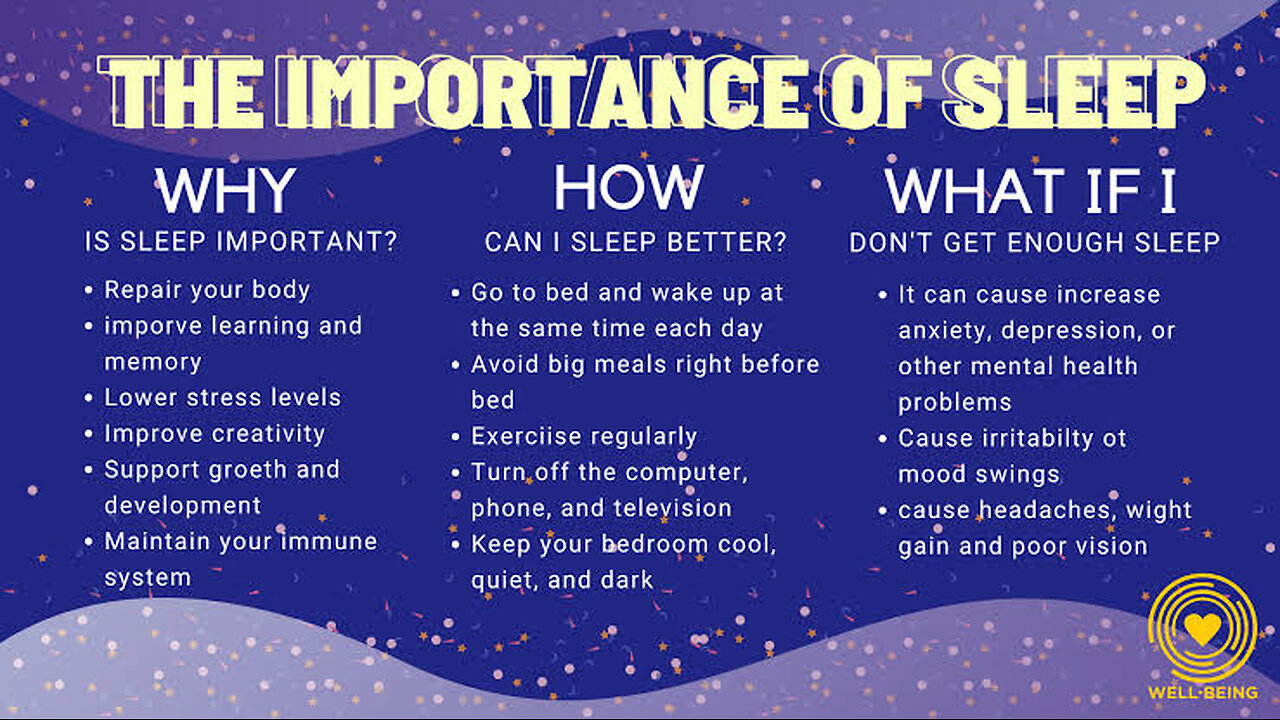Premium Only Content

Sleep for Health
Sleep plays a crucial role in maintaining overall health and well-being. Here are some key aspects of how sleep contributes to health:
Physical Health:
Recovery and Healing: During sleep, the body undergoes repair and regeneration of tissues, muscles, and cells.
Immune Function: A good night's sleep supports a robust immune system, helping the body defend against illnesses.
Mental Health:
Cognitive Function: Sleep is essential for cognitive functions such as memory, attention, and problem-solving.
Emotional Well-being: Lack of sleep can contribute to mood swings, irritability, and increased stress.
Weight Management:
Hormonal Regulation: Sleep influences hormones that control appetite. Poor sleep may lead to hormonal imbalances and potential weight gain.
Cardiovascular Health:
Blood Pressure: Adequate sleep is linked to healthy blood pressure levels, reducing the risk of cardiovascular diseases.
Metabolism:
Blood Sugar Regulation: Sleep helps regulate blood sugar levels, impacting the risk of diabetes.
Aging and Longevity:
Cellular Repair: Quality sleep may contribute to the longevity of cells, potentially slowing down the aging process.
Mood Regulation:
Stress Reduction: Adequate sleep is crucial for managing stress and promoting mental resilience.
Performance and Productivity:
Concentration and Focus: Quality sleep enhances cognitive performance, leading to better concentration and focus during waking hours.
Daytime Alertness: A well-rested individual is more alert and productive throughout the day.
To promote better sleep and overall health:
Maintain a consistent sleep schedule.
Create a comfortable sleep environment.
Limit exposure to screens before bedtime.
Be mindful of caffeine and alcohol intake.
Engage in relaxation techniques before sleep.
-
 5:23
5:23
Movies, Videos, News and More
3 days agoJoe Rogan Proves Moon Landing Is Fake
402 -
 UPCOMING
UPCOMING
Jewels Jones Live ®
2 days agoEXPOSING CORRUPTION | A Political Rendezvous - Ep. 114
1.74K5 -
 1:11:40
1:11:40
Michael Franzese
2 hours agoWhat's the deal with Tate brothers?
27.1K19 -
 17:54
17:54
The Rubin Report
3 hours agoTechnology Utopia or Dystopia? Eric Weinstein, Laila Mickelwait & James Poulos
24.8K24 -
 1:12:29
1:12:29
Mike Rowe
2 days agoWHY Is America The Biggest Lumber Importer In The World? | Mike Albrecht #428 | The Way I Heard It
39.7K34 -
 1:19:23
1:19:23
Steve-O's Wild Ride! Podcast
2 days ago $7.09 earnedMrBallen Blows Steve-O's Mind With Insane Stories - Wild Ride #254
32.4K15 -
 2:27:21
2:27:21
I_Came_With_Fire_Podcast
13 hours agoTURKEY is the DARK HORSE NATO Nation That Could START WW3
37.6K6 -
 2:13:40
2:13:40
Rotella Games
23 hours agoFamily Friendly Saturday Morning Fortnite
21.3K -
 LIVE
LIVE
Major League Fishing
2 days agoLIVE Tackle Warehouse Invitationals, Stop 2, Day 2
539 watching -
 4:59:34
4:59:34
SoundBoardLord
7 hours ago90's Cartoons, Chill Vibes, Good Conversations!
23.1K2